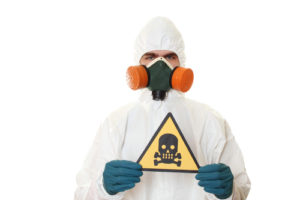Mold 101: OSHA Gives Guidance on Mold in the Workplace

Mold At The Work Place
The Occupational Safety and Health Act of 1970 (OSH Act) requires that all employers provide “safe and healthful working conditions” for all employees. While people often interpret the regulation in terms of physical risks, a workplace should also include clean air without excess levels of mold.
OSHA, the governing body established to enforce the OSH Act, offers tips about detecting and preventing mold exposure in the workplace.
Where Is Mold Found?
Mold spores are present everywhere, but they usually don’t cause problems at normal levels outdoors. Problems arise when the spores land on a damp spot indoors where they can multiply.
Common breeding grounds for mold in the workplace include:
- Leaky or sweaty pipes
- Poorly-maintained drain pans
- Damp foundations
- Poorly vented kitchens, showers or any area where steam is present
Building-Related Illnesses (BRIs)
A building-related illness is one that includes symptoms objectively found to be linked to specific elements inside the building. Mold-related BRIs are often allergic conditions such as rhinitis, asthma and hypersensitivity pneumonitis.
Reducing Risk of Mold BRIs
- Conduct regular inspections for water leaks, damaged door and window seals, and visible mold.
- Make sure all damp areas and equipment are cleaned and dried as soon as possible.
- Wherever possible, vent all moisture-generating appliances and equipment to the outside.
Effective Manhattan Mold Remediation for Buildings and Workplaces
Workers compensation claims are some of the biggest expenses for any business. Our two-step MoldExterm Manhattan mold remediation program makes your workplace safer by removing existing mold and preventing future infestations. Contact us today to schedule a free mold inspection by one of our friendly and professional technicians.



